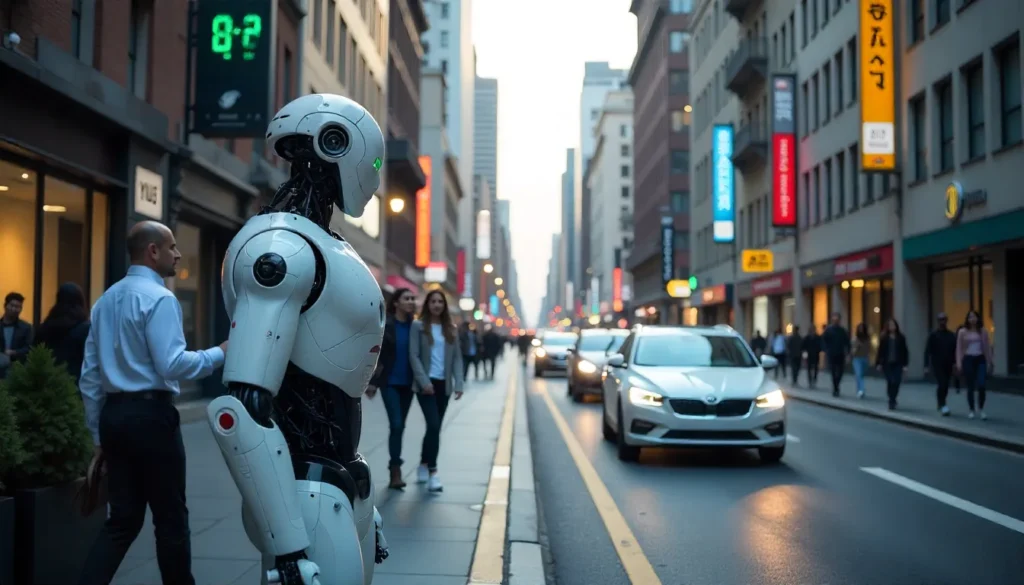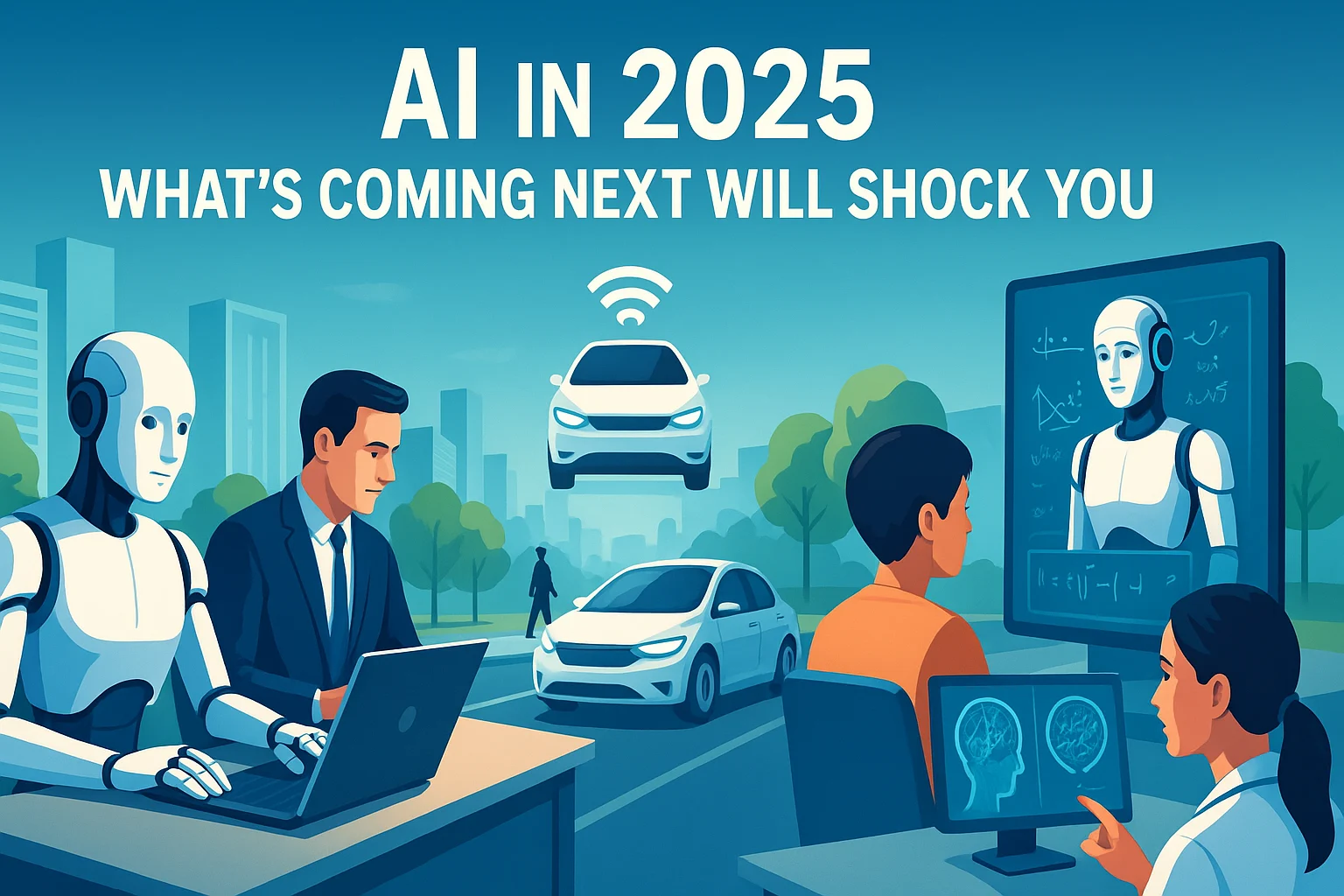Artificial intelligence has grown faster than anyone expected. In 2025, it is no longer a tool you only read about in tech news. It is shaping jobs, schools, hospitals, and even the way we think. The speed of change has caught both experts and regular people by surprise. Many are asking: what comes next? The answers may shock you.
Table of Contents
Smarter Than Ever
AI in 2025 is not just about smart chatbots or image tools. These systems can now solve complex math, write clear code, and even debate tough issues. The models are trained on more data than ever. This makes them quick, sharp, and almost human in the way they respond. Some even learn from real-world use, making them better day by day.
This growth has raised a big question: how close are we to AI that can think like us? While full human-level thinking is still not here, the gap has narrowed. Machines in 2025 can handle tasks that once needed years of study.
Jobs on the Line
Workplaces are feeling the heat. AI in 2025 has replaced many routine jobs. Customer support, data entry, and even parts of journalism are now done by machines. Companies save money by using AI, but workers are left worried about their future.
At the same time, new roles are opening. People are hired to guide, check, and manage AI systems. Jobs in prompt design, AI testing, and ethics review are growing. The shift is clear: if your job is simple and repeatable, a machine might take it. If your work needs judgment and creativity, AI is more likely to help than replace.

Schools Are Changing
Education is seeing big changes. In 2025, AI tutors can teach kids in a way that feels personal. They adjust to each student’s pace. They explain math or science in plain words. Some schools use AI to track progress and spot weak areas before they become big problems.
But teachers are not out of the picture. The best results come when human teachers and AI work together. Machines help with lessons and grading, while teachers focus on guiding and inspiring. The real shock is that students now learn faster than before, with fewer gaps.
Health at a New Level
Doctors once feared AI would replace them. In 2025, it is clear that the truth is more balanced. AI scans images and finds disease signs faster than human eyes. It reads lab reports and spots risks that may go unnoticed. Patients get results quickly, often within minutes.
Still, people want human care. No one wants to hear bad news from a robot. Doctors use AI as support, not as a full replacement. The mix of human empathy and machine accuracy saves lives. In some hospitals, survival rates have gone up because of AI.
Deepfakes and Mistrust
Not all shocks are good. By 2025, deepfakes have become harder to detect. Fake voices and videos can fool almost anyone. This makes politics, media, and online trust more fragile.
AI tools that spread false news are now easy to use. A teenager with a laptop can make a clip that looks real. Governments and companies are racing to build detection tools, but the fight is tough. Many experts warn that truth itself is at risk.
AI in Daily Life
Look around in 2025 and you will see AI everywhere. Cars drive themselves in more cities. Phones act like real assistants, booking tickets and planning trips without human input. Smart homes adjust lights, food orders, and even mood music without asking.
This brings comfort but also new worries. If machines know your habits, they also know your secrets. Privacy is thinner than before. People trade safety and ease for control of their own data.
Law and Rules
Governments in 2025 are trying to catch up. Some countries now require clear labels on AI-made content. Others demand strict checks on how AI is trained. Fines for misuse are growing.
Still, rules vary. In some places, AI faces tight limits. In others, it runs free. This split makes global use harder. One app may be legal in one country but banned in another. The lack of unity makes it tough for both users and makers.
Creative Power
Artists once saw AI as a threat. By 2025, many use it as a tool. Painters, writers, and musicians blend human skill with machine ideas. A song can start with AI notes, then be shaped by a human hand. A story can begin with machine text, then be edited with heart and voice.
The shock here is not loss, but gain. Some of the best works in 2025 are human-AI projects. The line between creator and tool is blurry, but the results are often stunning.
AI and You
So what does AI in 2025 mean for you? It depends on how you use it. If you ignore it, you may fall behind. If you learn to use it, you gain speed and skill. Many people use AI daily without even noticing. From shopping to health advice, it is in your pocket and your home.
The big lesson is that AI is not just a trend. It is part of life now. The shock is not that machines can think, but that they already shape so much of our world.
What Comes Next
Looking beyond 2025, the path is both bright and dark. AI could cure more diseases, teach more kids, and solve climate issues. But it could also deepen mistrust, take more jobs, and control parts of life we may not want to give up.
The truth is simple: AI is not going away. The question is how we guide it. Do we let machines set the pace, or do we build rules and use them wisely? The answer will shape not just work or school, but the very way we live.
Final Thoughts
AI in 2025 is powerful, fast, and surprising. It can save lives and also spread lies. It can teach a child and also take a worker’s job. The shock is not just in what AI does, but in how quickly it has entered every part of life.
The choice is ours. We can fear it, or we can shape it. One thing is sure: the story of AI in 2025 is only the start of a bigger change still to come.
Frequently Asked Questions About Ai In 2025
1. Will AI take all jobs in 2025?
No. AI is replacing simple and repeatable tasks. But it is also creating new roles in AI testing, prompt design, and system management. Jobs that need human judgment and creativity are safer.
2. Is AI in 2025 safe to trust?
AI is useful but not perfect. It can make mistakes or show bias. Always double-check important results with human review, especially in health and finance.
3. How is AI changing daily life in 2025?
AI is part of everyday tools like phones, cars, and smart homes. It makes life easier but also raises privacy risks since machines track habits and personal data.

